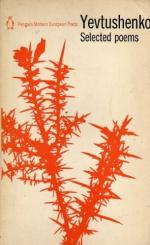|
This section contains 944 words (approx. 4 pages at 300 words per page) |

|
SOURCE: "Past, Implacable," in The Economist, Vol. 306, No. 7535, January 30, 1988, pp. 75-6.
In the following essay, the critic draws parallels between Yevtushenko's poetic themes and glasnost, concentrating on "Bukharin's Widow" and "Monuments Not Yet Erected."
Yevgeny Yevtushenko, the modern Russian poet the West knows best, is not only delighted about glasnost; he takes some personal credit for it. Those now trying to push through reforms, he thinks, are probably the same people who went to his poetry readings in the late 1950s and early 1960s in clubs and factories and theatres round the country; the new openness is "an echo of our poetry." And it is poetry, in Mr Yevtushenko's eyes, that will have to drive glasnost on.
He is playing his part with his usual fierceness. Last June, after a meeting with the widow of Nikolai Bukharin, a Bolshevik leader executed by Stalin in 1938, he wrote "Bukharin's Widow...
|
This section contains 944 words (approx. 4 pages at 300 words per page) |

|


